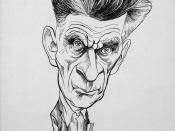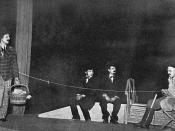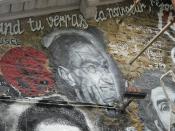Can we equate our understanding of Physical expounded by practitioners like Artaud and Grotowski to the work of Samuel Beckett? Discuss.
Ben Smithard.
In order to fully grasp the question it needs to be addressed in a detailed manner. On the surface Samuel Beckett's style is of a complete contrast to that of Artaud's and Grotowski's, as their approach and style differ. On the surface Beckett's work does not seem physical at all. Yet who can define the term physical? I believe that all Theatre is physical to an extent and I believe that Beckett's work is of a physical nature, subtle as it may be.
I shall address Artaud and Grotowski's techniques and theories to gather an understanding of their physical theatre. Then we need to look deeply into Beckett's work, especially on his concentration of the voice, gesture and movement to detect the physicality in Beckett's work.
"ÃÂThis man (Beckett) seemed to have lived and suffered so that I could see, and he was generous enough to pass it on to me.' (George Devine.) "ÃÂBeckett's plays stay in the bones. They haunt me sleeping, coming upon me when I am least aware.' (Alan Schneider.) There can be no denying that there is "ÃÂsomething' about Samuel Beckett, no matter how you perceive his work. To this very day you will not be able to find anyone who can convincingly explain the meaning behind his work, only an opinion. Brooks Atkinson in his review of Waiting for Godot (New York Times, 1956) states "ÃÂDon't expect this column to explain Samuel Beckett's Waiting for Godot. It is a mystery wrapped in an enigma. Since Waiting for Godot has no simple meaning, one seizes on Mr Beckett's experience of two worlds to account for his style and point...


